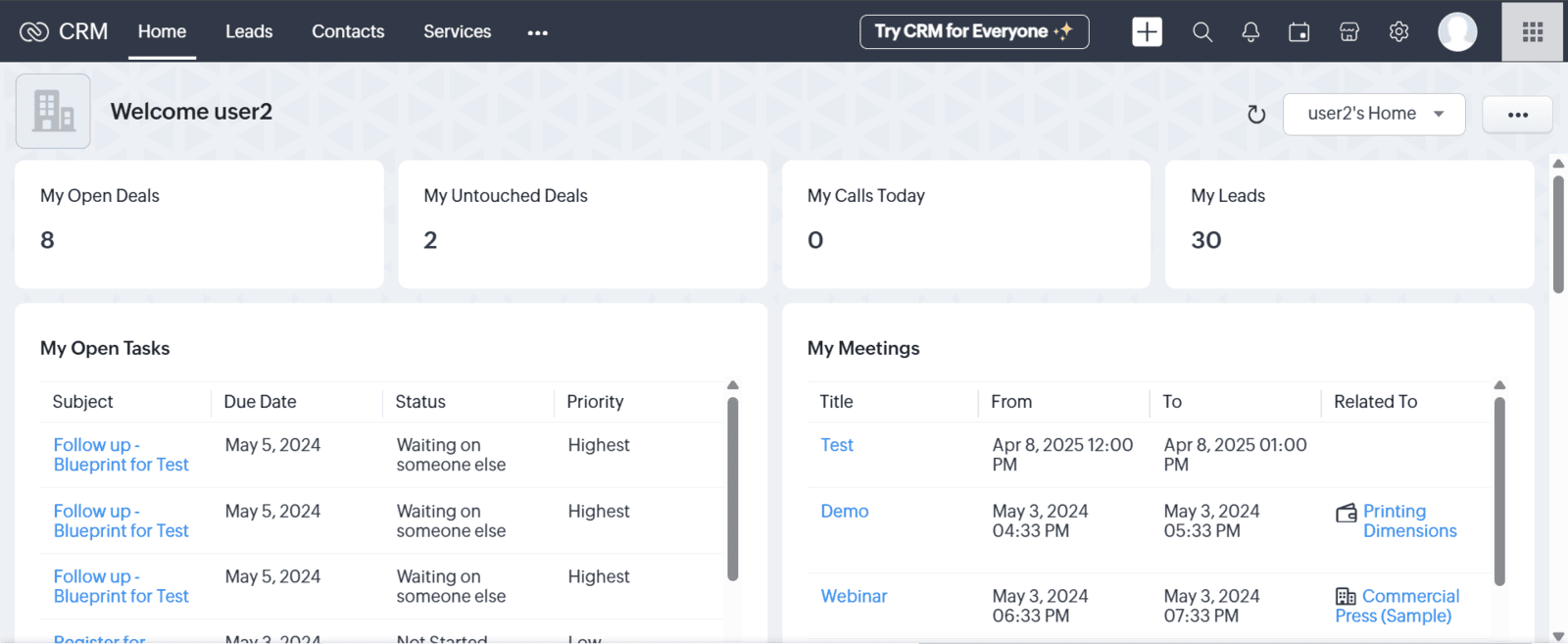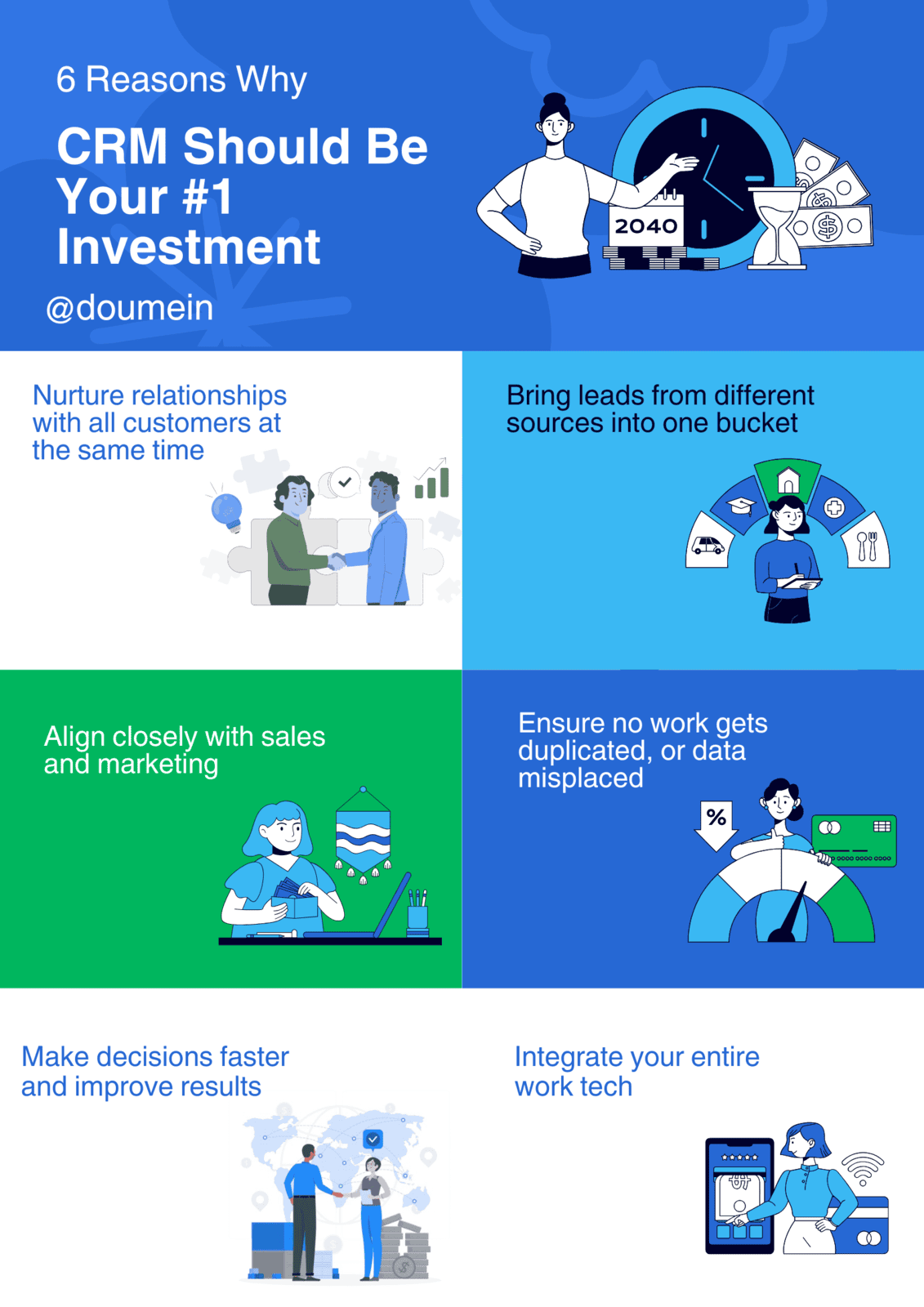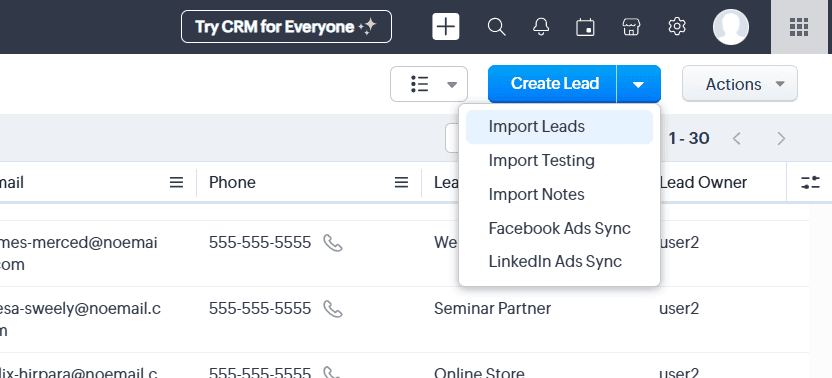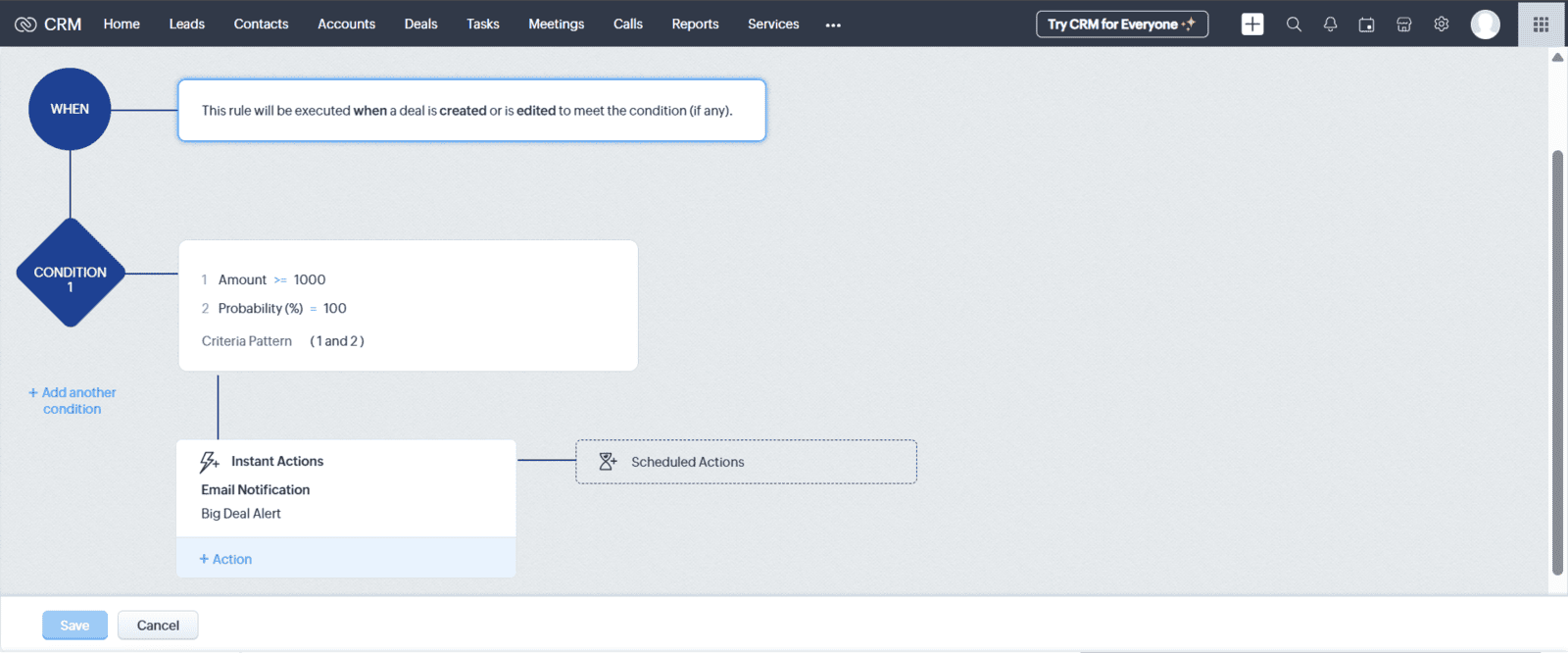You started this business with a dream, one that kept you up at night, that made you sacrifice weekends, miss birthdays, and pour every ounce of yourself into building something real. You’ve come far.
From the outside, it looks like you’ve made it.
But inside, you’re tired.
Tired of chasing scattered leads. Of losing track of conversations. Of repeating the same tasks, answering the same questions, fixing the same messes. You know your customers deserve more. You know your team is capable of more.
That's a signal that your business has outgrown the way things were.
That it’s time to bring everything, and everyone together. That's exactly what a CRM does.
A CRM enables you to work effectively, automates repetitive tasks, avoids duplication of work. It Includes pre-recorded audio that assists in customer problem-solving and information dissemination, can handle customer requests to cut down the length of calls and streamline customer service processes.
Yes, early adoption of CRM means early access to clean, structured customer data essential for accurate targeting, automation, and personalization.
Starting your business? Don’t wait to get organized
Early adoption to CRM means early access to optimisation of your business. You’re juggling 10 things at a time leads, emails, calls, DMs, team tasks, customer query and so on. Do you think you can remember it in one go and disseminate the information across departments at ease.
Every business needs a structure that streamlines workflow. So, Now CRM enables employees to focus on high-level and creative tasks that help them close deals.
The early hustle feels glorious—Until the chaos begins
At the beginning, there’s adrenaline. You’re energized, moving fast, chasing leads, replying to emails, hopping on calls, responding to DMs, assigning team tasks, doing it all. It feels like you’re building something real, something big. But soon, the cracks start to show.
You forget a follow-up that could’ve closed a deal. You miss a client message buried under a pile of other chats. You lose track of who said what, when, and where. And just like that, momentum turns into mayhem.
The truth is, hustle alone doesn’t scale. Without systems in place, the very energy that fuels your growth can also become your downfall. Every small business hits this tipping point. You don’t just need hard work, you need structure. You need visibility, accountability, and consistency across your operations.
That’s when you stop running in circles and start moving forward with purpose.
You don’t need a big team, you need a big system
CRM works well even for startups, small business or even for a solopreneur. It helps in easy implementation, lead generation and everything that helps a business to close deals. Leveraging the power of this tool helps you scale you business but still it come's with a premium price tag.
What is a CRM? Why is it a game-changer for small businesses
A Customer Relationship Management tool is considered as the brain of your business as the system enables the POC's or the support agents with a detailed data on customers personal information, purchase history, buying preferences and concerns.
This is done by compiling customer data across different channels, creating an easy and an accessible workflow. So, It helps you build better relationships with your customers, not just store phone numbers.
It’s more than just a fancy contact book
CRM enhances the customer experience by automating necessary pipeline, spotting future trends using the past purchase history, centralises your customer data, automates follow-ups, sends reminders, tracks conversions which in-turn helps you work smarter, not harder.
Not just that CRM helps you with customer behavior analysis which helps you to predict your next move.
6 Reasons why CRM should be your first investment
Do you know, 40% of businesses switch to CRM due to inefficiency. Still 49% of companies still use third-party tools (like email software) for CRM. 18% rely on spreadsheets. 21% have no system at all. Manual tracking leads to missed opportunities. Take a look at the 6 reasons why CRM should be your first investment.
1. Customer relationships
Without a CRM, it’s tough to build long-term meaningful connections. You may forget important details, lose track of conversations, or miss the chance to customise your communication.
Targeted sales functions help in necessary follow-up of leads, obtain new customers and build customer loyalty. If you don’t have a CRM tool, it’ll be harder to build sustainable customer relationships. As it tracks interactions and helps businesses offer personalized experiences.
2. Lead management
Leads slipping through the cracks? You’re burning money on marketing without ROI. Your sales team is chasing the wrong leads. You’re losing to competitors who simply follow up faster. It happens more often than you'd think. A CRM ensures no opportunity gets forgotten and makes it easy whether it's a new inquiry or a returning customer.
A CRM captures every lead in one place and makes sure you stay on top of follow ups, so no opportunity gets lost. When leads are nurtured systematically, conversion rates improve and sales cycles shorten.
3. Sales and marketing collaboration
Sales and marketing are often treated as different activities but if they work together the business grows in 2.3x speed likely to see a strong commercial growth. It also help in enhancing the marketing efforts at different touchpoints in the lead generation lifecycle.
A CRM helps both teams share information, track customer journeys, and stay aligned. The Result is better teamwork, faster conversions, and a more consistent customer experience. Collaboration can improve productivity, innovation, problem-solving, communication, workplace morale, retention, engagement, and more.
4. Workflow organization
As tasks pile up, staying organized becomes tougher. Without a central system, your team ends up doing duplicate work or missing steps.
A CRM will record past preferences and interactions so that each interaction is like a continuation of the one before, without this the customer service will be on the thread.
It helps organize your workflows so tasks are assigned clearly, it integrates customer service, sales, and marketing for better teamwork, So everyone knows what’s next. As an Organized workflows and effective communication are the essentials for the success of a business.
5. Tool integration
Modern businesses use many tools: emails, messaging apps, marketing platforms, and more. So the scattered data from across channels are integrated with customer service, sales, and marketing for better teamwork. Making it easier to manage everything from one dashboard.
6. Data-driven decision-making
You can't grow on guesswork alone. Planning is the main function of management as it bridges the gap between the unknown. Planning is only effective when decisions are based on accurate and timely information. A CRM gives you clear insights into what's working and what’s not like which campaigns bring in the most leads or how your team is performing.
5 Common CRM myths that hold businesses back
1. I’ll get one when my business grows
Interestingly, around 15% of users still rely on spreadsheets, especially in companies that haven’t matured digitally. But as a company grows, spreadsheets become increasingly difficult to manage and lack the accuracy needed for effective decision-making.
2. CRMs are expensive and hard to use
We’re seeing the emergence of modular CRMs where businesses only pay for the features they need. The rise of no-code/low-code CRMs is empowering users to tailor systems without expensive developers. And some providers are offering extensive features, data security, scalability, and robust integrations without the enterprise-sized bill.
3. CRMs are only for sales teams
While CRMs were originally built for sales pipelines, they’ve evolved far beyond that. Today’s CRMs are central hubs for customer relationships, used by marketing, support, success, and operations teams alike.
From automating welcome emails and tracking support tickets to sending reminders for customer renewals or gathering feedback, CRMs give every team member visibility into a customer’s journey. For example, your support rep can see purchase history, your marketer can segment audiences based on behavior, and your account manager can follow up at the perfect time. It’s about building long-term, repeatable relationships.
4. My customers don’t need personalized communication
Customers today expect more than just a transactional relationship—they expect relevance. Whether you're selling products or offering services, personalized communication boosts engagement, trust, and loyalty.
Assuming your customers are okay with generic emails or vague follow-ups is risky. A CRM helps you segment audiences, tailor communication based on purchase behavior, preferences, or interactions, and send messages at just the right time. Whether it’s a birthday coupon, a product recommendation, or a simple “we miss you” note, these small touches build emotional equity.
5. Implementing a CRM is time-consuming
It’s understandable to be wary of another tool eating up your time, but modern CRMs are built for speed and ease. Many can be set up in just a few hours or a couple of days, not weeks.
Most platforms offer step-by-step onboarding, pre-built templates, and integrations with tools you’re already using, like Gmail, WhatsApp, or Google Sheets. And because CRMs automate many routine tasks (like lead follow-ups, assigning tickets, sending reports), they end up saving you dozens of hours each month. The real question isn’t whether you have time to implement a CRM. It’s how much time you’re wasting without one.
Why Zoho CRM is perfect for small businesses
Zoho CRM's are budget-friendly, easy to implement, and offers everything from lead generation to deal closure. Highly customizable workflows, AI-powered suggestions, and process automation help improve efficiency as teams grow. As it Integrates with WhatsApp, Gmail, Instagram, Zoho Books, Campaigns, etc.
Budget-friendly without cutting corners
One of the biggest barriers to adopting a CRM for small businesses is cost. Zoho CRM breaks that myth. With flexible pricing plans, including a free tier and affordable paid options, Zoho ensures you only pay for the features you actually use. There’s no need to overspend or invest in bloated software when you can get access to powerful tools at a fraction of the cost.
Easy to set up, even easier to use
Zoho CRM is known for its intuitive interface and smooth onboarding process. You don’t need to be a tech expert to get started. Whether you’re importing contacts from spreadsheets or integrating with your email, the platform walks you through setup with minimal learning curve. Plus, it comes with customizable dashboards and pre-built templates to help you hit the ground running.
Customizable workflows that fit your business
Every business is different, and Zoho CRM gets that. It offers a highly customizable interface where you can tweak pipelines, automate follow-ups, build custom fields, and assign roles based on your team's needs. Whether you’re a service business tracking project stages or a product-based company managing stock and deals, Zoho adapts to your flow, not the other way around.
Seamless integration with your favorite tools
Small businesses often rely on multiple tools to run daily operations, and Zoho plays well with almost all of them. It integrates effortlessly with:
- WhatsApp: for real-time communication and support
- Gmail and Outlook: for email tracking and automation
- Instagram and Facebook: for social lead capture
- Zoho Books: for finance and invoicing
- Zoho Campaigns: for email marketing
- Google Calendar, Sheets, Drive: for productivity
What makes working with a Zoho implementation partner easier than DIY
So, you've decided to adopt Zoho. Great choice—it's powerful, flexible, and packed with features. But here’s the thing: setting it up right is just as important as choosing the right tool.
A certified implementation partner helps you cut through the noise. They don’t start by showing you every feature; they start by asking:
“What does your business actually need?”
Whether you’re a sales-driven startup, a service agency juggling client projects, or a retail business dealing with stock and invoices, they shape Zoho around your unique workflows. No guesswork. No one-size-fits-all. That's exactly what Doumein does.
With Zoho, you’re actually getting a full ecosystem, CRM, campaigns, books, inventory, analytics, support, and more. Most users only scratch the surface.
The best implementation partner like Doumein shows you what’s possible, maybe that means syncing with your marketing team for personalized campaigns, or building dashboards to monitor sales in real time. They help you see how all the puzzle pieces connect to give you the full picture of your business.
As a business owner, you already know customer service is essential. Implementation isn’t a “one and done” situation. Businesses evolve. So do processes. A Zoho partner becomes your ongoing growth ally, helping you adapt the system as your business changes.
Need to automate a new workflow? Launch a new product? Integrate a new app? You’ve got someone who already understands your setup, and can help you scale without skipping a beat.
Contact us today to explore Zoho CRM in all its glory, and how Doumein can hyper-customize it for your business.




